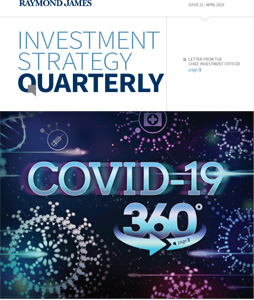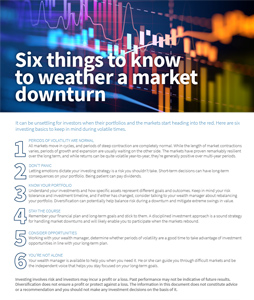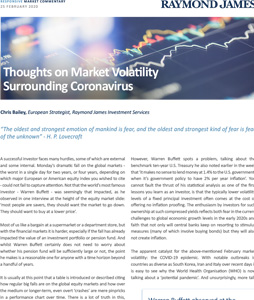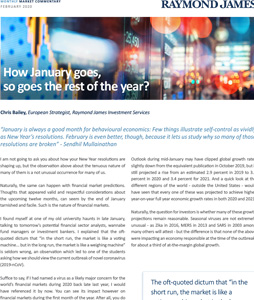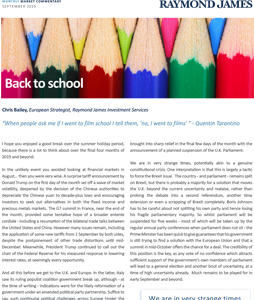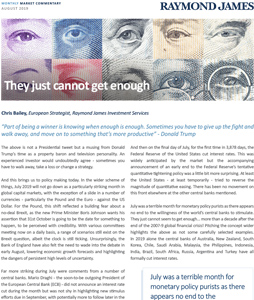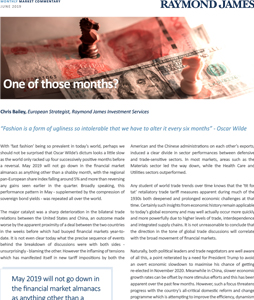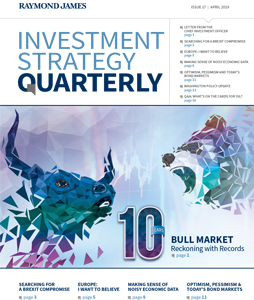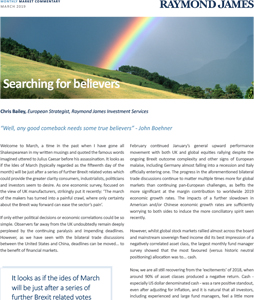The COVID-19 outbreak has led to unprecedented volatility and tremendous declines in wealth, but we have faith that once the pandemic is defeated, the wild swings in the financial markets will abate and prosperity will return. But what cannot be so easily recovered is the loss of a job, the loss of a business, or, worst of all, the loss of a loved one. While it is our duty to provide timely market insights, please know that now, more than ever, the health and safety of you and your families is at the forefront of our minds.
Six things to know to weather a market downturn
Thoughts on Market Volatility Surrounding Coronavirus
A successful investor faces many hurdles, some of which are external and some internal. Monday’s dramatic fall on the global markets – the worst in a single day for two years, or four years, depending on which major European or American equity index you wished to cite – could not fail to capture attention.
How January goes, so goes the rest of the year?
I am not going to ask you about how your New Year resolutions are shaping up, but the observation above about the tenuous nature of many of them is a not unusual occurrence for many of us. Naturally, the same can happen with financial market predictions. Thoughts that appeared valid and respectful considerations about the upcoming twelve months, can seem by the end of January tarnished and facile. Such is the nature of financial markets.
Back to school
They just cannot get enough
One of those months?
With ‘fast fashion’ being so prevalent in today’s world, perhaps we should not be surprised that Oscar Wilde’s dictum looks a little slow as the world only racked up four successively positive months before a reversal. May 2019 will not go down in the financial market almanacs as anything other than a shabby month, with the regional pan-European share index falling around 5% and more than reversing any gains seen earlier in the quarter. Broadly speaking, this performance pattern in May – supplemented by the compression of sovereign bond yields – was repeated all over the world.
Financial markets: never easy but always fascinating
Thinking about everyone’s favourite subject, it was striking to read that a well-known UK consumer confidence index indicator released in the last few days was flat for the third month in a row, with an accompanying write-up that included the comment that ‘despite political carry-on in the Westminster bubble with the clock ticking on Britain’s eventual departure from the EU, consumers are holding firm and remain unshaken by the daily headlines of turmoil and intrigue’. Too right that there is a real and breathing UK economy still out there… and that the ongoing Brexit debate does not need to exclusively define the UK economy and its prospects.
10 Years Bull Market Reckoning with Records
Searching for believers
Welcome to March, a time in the past when I have gone all Shakespearean in my written musings and quoted the famous words imagined uttered to Julius Caesar before his assassination. It looks as if the Ides of March (typically regarded as the fifteenth day of the month) will be just after a series of further Brexit related votes which could provide the greater clarity consumers, industrialists, politicians and investors seem to desire. As one economic survey, focused on the view of UK manufacturers, strikingly put it recently: ‘The march of the makers has turned into a painful crawl, where only certainty about the Brexit way forward can ease the sector’s pain’.
